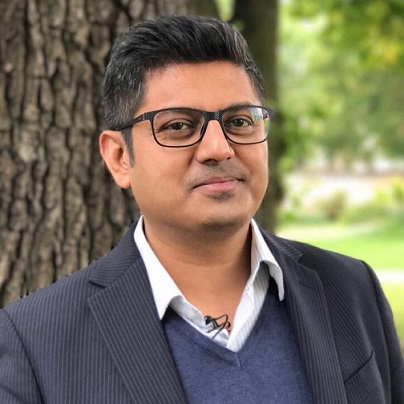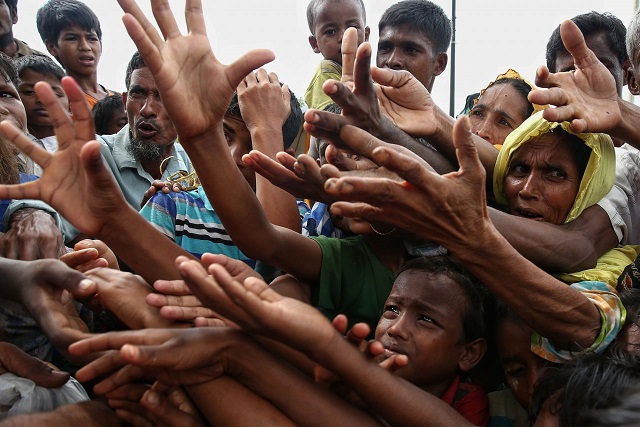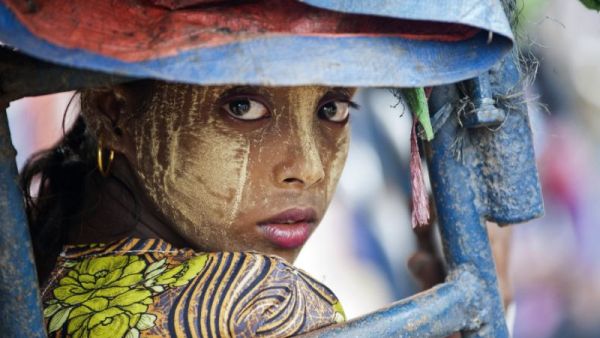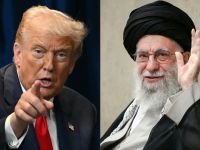- "My demand is to restore citizenship" to the Rohingya people, Lwin maintains
- "The international community is failing again and again to take the serious action against the Myanmar government..."
- The Rohingya people have been "living in the condition of apartheid for more than 25 years."
- "Instead of talking," the international community "should take practical action."
By Ty Joplin
The world watched in horror as the latest crisis for the Rohingya people unfolded in Myanmar earlier this year. Mass murders, systematic rape and endless displacement--the Rohingya have persevered through unspeakable atrocities committed by the Myanmar government and military.
The U.N. deems the Rohingya, who have lived in the Rakhine State, historically known as Arakan, some of the most persecuted people in the world.
The latest attempts by the Myanmar government to purge itself of its Rohingya minority started three months ago and is ongoing. Tens of thousands have fled into Bangladesh, seeking protection and aid.
In 1982, the Myanmar government stripped the Rohingya people of their citizenship, making them all stateless.
Today, the Associated Press released a report detailing the “sweeping” and “methodical” rape of Rohingya women as a tactic against the population. Three days ago, the U.K. Parliament issued statement, “the violence against the Rohingya in Northern Rakhine in Burma amounts to ethnic cleansing, and may also constitute crimes against humanity and even genocide.”
Despite this, prominent Rohingya activist Nay San Lwin says the international community has failed the Rohingya people. In an interview with Al Bawaba, Lwin decries the verbal condemnation of the Myanmar government without the subsequent action he deems necessary to ending the crisis.
Lwin visits Bangladesh regularly and runs the popular blog, Rohingya Blogger, which collects narratives of the Rohingya people’s persecution in addition to developments surrounding their humanitarian plight.

Nay San Lwin (Twitter)
TJ: What do you think is the main issue in regards to the Rohingya crisis that people aren’t talking about right now?
"Actually this long-term persecution against the Rohingya people--it start[ed] since 1978. The people came to know, you know, from the violence broke out there, like in 2012 and again in 2016.
And now, since past three months, the crisis is in place. But actually the plight of the Rohingya, we call it the genocide--this slow-burning genocide.
It start[ed] in 1978. Since then, in 1982, the Rohingya population became stateless within their own country and [the] Myanmar government has been trying to wipe out this population from the country since 1978.
It was [a] fast exodus. Again in 1991, there was [a] second exodus. And now in [2017], this is the third exodus. Actually the national policy itself is to cleanse the whole population from the country and also these people are living in the open-air prisons.
Since 1992 they have imposed many restrictions against the Rohingya people, like the freedom of the movement, freedom of marriage... and also access to the education, access to the health care. So today U.N. is saying it is technically, they are realizing it has an element of the genocide. But actually it is a complete genocide against this population."
--------------
So what I’m hearing is that something that isn’t necessarily being covered is that this genocide has been going since 1978?
"Yes. All right, since 1978--actually these people, the Rohingya population, they used to be the recognized citizens of Myanmar. And also the Rohingya attending group [meaning the Rohingya residents of Myanmar] was one of the attending group since after [the] independence of Burma in 1948. But those citizenship[s] got issued early in 1950s were taken away since 1974.
Now the people, like you know, they don’t have any document[s]--they became stateless within their own country.
They remain stateless."
--------------

A Rohingya child receies a haircut from volunteers (AFP/FILE)
Do you think that there are any viable solutions to end that--the crisis or the genocide?
"Yeah this only depends on the Myanmar government. They have to end the crisis. They have to change their national policy. This national policy is that they don’t want this [Rohingya] population in the country. They are labelling the whole Rohingya population as recent illegal immigrants from Bangladesh. But we have many primary source evidence that we are in this Arakan state since before the 18th century.
According to the 1982 Citizenship Law, the attending group has to be in the country since before 1823. We have strong evidence that we are existing in the Arakan since before 1823. Yet the government is the one who make the decision whether this is the attending group or not. So according to their policy, we are refused to accept as an attendant group."
--------------
And with that, who do you think should take responsibility for solving that crisis? It doesn’t sound like Myanmar is capable or willing to do that. Do you think the U.N. should step in?
"Yes. The United Nations and also the international community. But the most responsible are the United Nations, they have to take strong action against the Myanmar government.
And also they should have the strong resolution from the U.N. Security Council, they have to refer to the International Criminal Court against these perpetrators--especially the Burmese military Commander-in-Chief, Min Aung Hlaing.
So once this military commander is punished by the International Criminal Court, I believe this persecution against the Rohingya will be ended."
--------------
But some of the international mediation--that could take a long time. What do you think is going to happen to the Rohingya people if the crisis continues?
"Now you know, half the population already fled to Bangladesh. Last week I was in Bangladesh, I saw with my own eyes. The situation is really dire. And you know, there are a lot of people who are not getting the aid regularly, some people don’t have anything to eat.
And also, the people who remain in the country, they cannot [get] access to the market, they don’t have any job. They don’t have any earning.
They are just locked up inside their village. So if this crisis continues, this persecution continues, all the remaining people will flee to Bangladesh. Then Bangladesh will have to handle this. Bangladesh is also the main actor; they have to pressure, very strongly, to the Myanmar government, to end this persecution against this population."
--------------
As an activist, what are you asking for and what do you hope to get from your work?
"My demand is to restore citizenship and attending right of the Rohingya people in Myanmar. These people should have the equal right[s] in Myanmar. And also, these people are really living in the condition of apartheid for more than 25 years. So the Myanmar government should allow them to rebuild their lives.
In this 21st century, they should live in the condition of the international standard. In Europe, we have everything--we can access to all the things. But they have nothing, they are like a prisoner. This [is] my only demand. But the international community is failing again and again to take the serious action against the Myanmar government and the Myanmar military.
This is why the persecution is continuing. So my request to the international community; take strong action and end this crisis."
--------------

Rohingya refugees reach for food at the Kutupalong refugee camp (AFP)
But why do you think the international community hasn’t taken the steps to help the Rohingya people?
"Since 1992, the United Nations has described this Rohingya population is the most persecuted minority in the world. But you know, now, 25 years already, they cannot take any action. That is the reason.
The Myanmar military can persecute this population since past three months, we don’t have even know exactly how many people were killed. But we estimate 4,000-5,000 people were killed, slaughtered, burned alive. Even small children. I have talked with survivors in Bangladesh.
So this all happened because there were no serious action against the Myanmar military."
This interview was edited for length and light grammar while respecting the voice of the speaker.
- Violence Against Rohingya 'May' Constitute Genocide: UK Report
- Rohingya Flee Myanmar, Only to be Exploited in Bangladesh: UN







